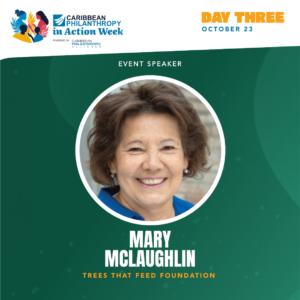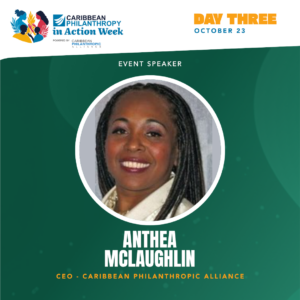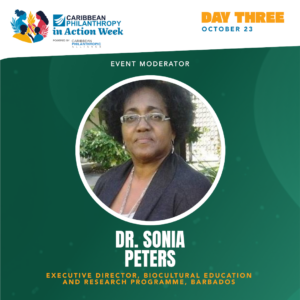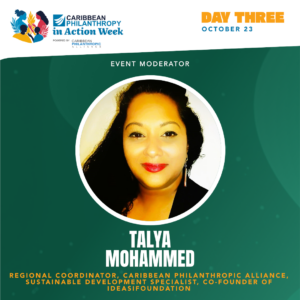Caribbean Philanthropy in Action Week 2024: Day 3 – Session 1
Women-Led Climate Philanthropy. This session focused on women’s leadership in addressing climate change and sustainable development in the Caribbean. Speakers emphasized the role of women in shaping communities and building resilience. The session highlighted initiatives like CariPhilAlliance WoMIND & BeYOND that equip women with tools for climate action and food security implementation.This renewed focus on gender equity underscores that empowering women is not only a matter of justice but also a strategic imperative for achieving sustainable development in the Caribbean.
Key Themes
Women-Led Climate Philanthropy-Mentorship for Leadership & Recognition.
Transforming Women Leadership through Inclusion
- Insights shared by women leaders from Africa and the Caribbean underscored the profound impact of women-led initiatives. Programs such as the Trees That Feed Foundation showcase the transformative power of empowering women in development efforts. In Rwanda, government policies that mandate gender inclusion at every level of governance serve as a valuable blueprint for the Caribbean, demonstrating how structural inclusion can catalyze societal progress.
Multiplying Effect through Financial Empowerment
- The financial empowerment of women generates a multiplier effect that benefits families, communities, and society as a whole. There is a critical need to strengthen support systems for women’s initiatives by -establishing mentorship and sisterhood networks; offering targeted capacity-building programs to equip women with essential skills; and facilitating women’s access to capital, ensuring that they have the financial tools necessary to lead impactful development projects.
Addressing Violence Across the Region
- Women leaders poetically expressed that while peace is a universal aspiration, there is an urgent need to acknowledge and address the multiple forms of violence that exist within communities across the region. Comprehensive solutions should prioritize safety, justice, and the empowerment of women and girls as key components of societal resilience.
Building a gender inclusive philanthropy ecosystem is now required to:
- Advocate for gender-inclusive governance frameworks at the regional level, drawing inspiration from successful global models.
- Encourage partnerships between philanthropic organizations and women’s networks to co-design solutions that address specific barriers faced by women leaders.
- Develop region-specific metrics to measure the success of women-led initiatives, ensuring accountability and the sharing of best practices.
Key Themes:
- Women’s lead in climate action globally
- Women are natural leaders and transformative with the innate drive and grounded knowledge to support their families and communities.
- Financial empowerment provides a multiplier effect and builds resiliency – personal, family, community
- Political will is required for gender inclusion at all levels of government
- Use international models for replication such as Rwanda Monitoring & Evaluation systems to monitor GI and mandatory land ownership for women which is used as critical lever for women financial independence and empowerment
Notable Initiatives & Announcements
- CariPhilAlliance WoMIND & BeYOND regional capacity-building initiatives
- Women Impact Awards: A new recognition platform celebrating outstanding women leaders who are driving transformative change in their communities.
- Climate Conscious Podcast Collaboration with CariPhilAlliance: A partnership to launch Caribbean Women for Climate Justice (CW4J) designed to dismantle existing biases and unlock financial resources to support women-led philanthropic actions, while also highlighting their stories and achievements.
Key Recommendations
Harnessing Women’s Leadership:
- Empower Women as Climate Leaders: Recognize and amplify women’s unique perspectives and skills in climate action.
- Support Women’s Organizations: Invest in women-led organizations and initiatives to strengthen their capacity and impact.
- Gender-Responsive Climate Policies: Develop and implement policies that explicitly address gender equality, gender-based discrimination and women’s empowerment in climate action.
- Inclusive Governance: Ensure women’s participation in decision-making processes at all levels of government.
Economic Empowerment:
- Secure Land Rights: Promote secure land tenure for women to enhance their economic opportunities and resilience.
- Financial Inclusion: Expand access to financial services, such as loans and insurance, to empower women economically.
- Skill Development and Entrepreneurship: Provide training and support for women to develop entrepreneurial skills and start businesses.
Monitoring and Evaluation:
- Implement Robust Monitoring Systems: Adopt effective monitoring and evaluation systems to track progress on gender equality and women’s empowerment in climate action.
- Learn from Best Practices: Explore and adapt successful models, such as Rwanda’s, to strengthen monitoring and evaluation efforts.
Building Resilience:
- Invest in Social Protection: Strengthen social protection programs to support women and their families during climate-related shocks and stresses.
- Community-Based Adaptation: Empower communities, particularly women, to lead local adaptation initiatives.
Speakers Highlights
One Dream, One Goal and Desire for Women to move their work forward?

Derval Barzey presented on climate conscious leadership Aspirational Dream: Shift generic systems to systems that cater and should be accountable to women multiple roles as policy makers, care takers, advocates, and the list goes on.

Mary McLaughlin shared Trees That Feed Foundation initiatives Aspirational Goal: Stay together, and let’s move our talk to action to make our respective agendas in education, agri- businesses happen in our countries

Leisa Perch discussed gender and environment intersections including the importance of creating policies sensitive to the multiplicity of needs of women Aspirational Goal: Peace is a desired goal, yet violence needs to be acknowledged given the numerous acts of violence against women

Ms. Josephine Nkurunziza shared Rwanda government’s political will and trajectory and successful journey towards Gender Inclusion. Aspirational Goal: To facilitate and support continuous efforts to build sisterhood networks to fight against the world that is not fair to women.

Ms. Che Greenwood shared BECT programs to support women pilot projects and start up funding Aspirational Appreciation: Extend grace to others, and herself, and extend gratitude to those women who have set a firm foundation and supported other women to grow and flourish.

Ms. Anthea McLaughlin shared the importance of women leadership in philanthropy and leading climate actions. Aspirational Goal: Respect for women’s contributions, and with respect, acknowledgement, appreciation, inclusion and recognition follows.

Ms. Sonia Peters facilitated. Aspirational Goal: Unity, and working together towards a singular focus, as emerging violence, for example, is a reoccurring issue across the Caribbean.

Ms. Talya Mohammed facilitated. Aspirational Goal: Tolerance and patience with each other, grow in grace and treat each other with each other and togetherness


Responses